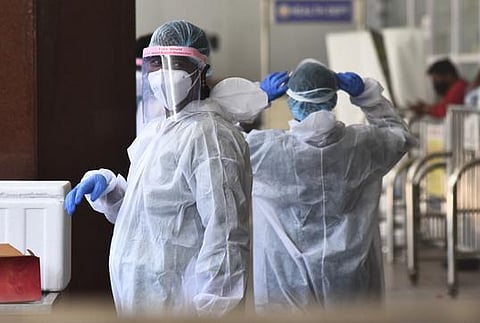

NEW DELHI: The Centre on Wednesday came up with a grim warning that a third Covid-19 wave in India was inevitable and admitted for the first time that B.1.617, an Indian mutant of the virus, could be fuelling the massive surge in the country.
"A phase three is inevitable, given the higher levels of the circulating virus, but it is not clear on what time scale this will occur. We should prepare for new waves," said K Vijay Raghavan, Principal Scientific Advisor to the Centre said on Wednesday.
Amid clamour for stricter measures to contain the spread of the fierce wave, Niti Aayog member (health), V K Paul, who also heads the national Covid-19 task force, did not rule out the possibility of a national lockdown to break the chain of the virus.
Listing the Centre’s guidelines like night curfews and restrictions in districts with over 10 per cent test positivity rate and more than 60 per cent ICU bed occupancy, Paul said: “In that direction there is a clear balanced advisory. At the same time, if anything more is required, those options are always being discussed, and decisions, as required, will be taken.”
Meanwhile, data shared during the briefing marked the B.1.617 variant – also known as double mutant – as a "variant of concern" for the first time. Samples collected from at least 18 states, which underwent genomic surveillance, showed the presence of the variant.
WATCH:
This variant, along with E484Q and L452R mutants, was first identified in February. Its spread has been exponential, overtaking several other local variants, including N440K and B.1.618, suggesting that it was more transmissible.
Data from other countries suggest that while E484Q can escape antibody neutralisation, L452R increases infectivity.
According to the WHO, this Indian strain has been detected in at least 17 countries, including the UK, US and Singapore.
Sources said that following a request by the UK government, India has agreed to send samples of B.1.617 for examining the efficacy of the available vaccines against it.
Renu Swarup, secretary of department of biotechnology, said initial data has shown that vaccines in India effectively neutralised the variants in circulation. More work is underway to fully establish the findings, she added.